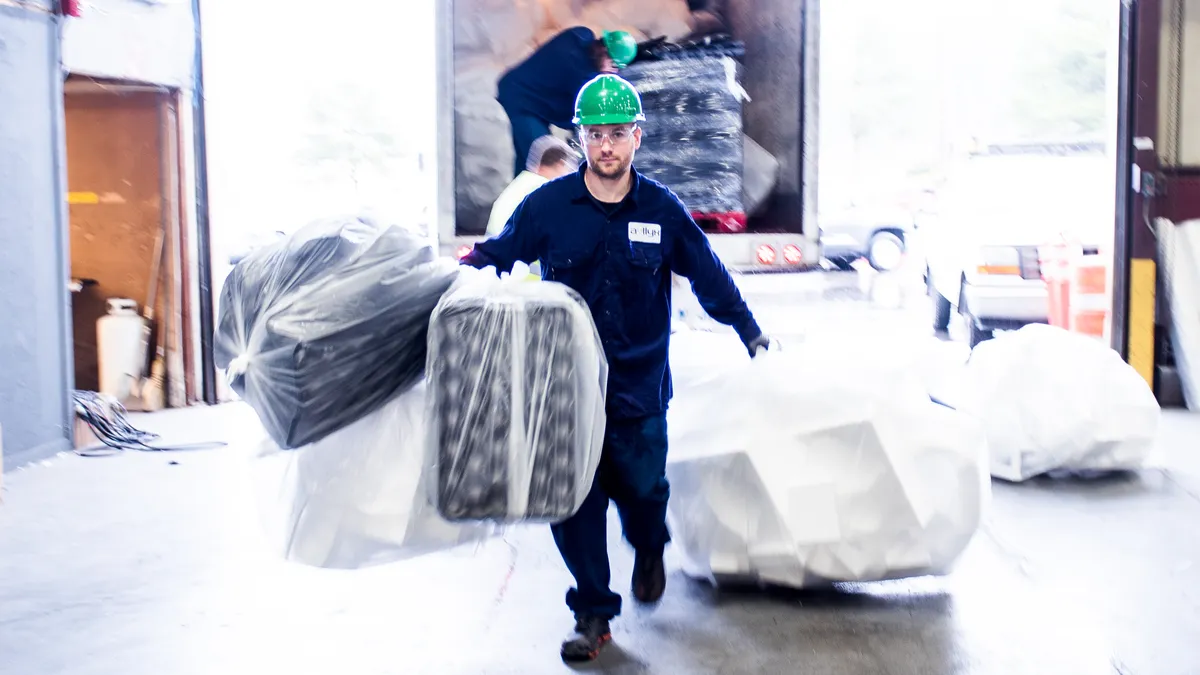Dive Brief:
- Plastics producers INEOS Styrolution and AmSty will use Agilyx's plastic recycling technology at a new polystyrene (PS) recycling plant to be constructed in Channahon, Illinois. This comes within days of announcing a four-way non-disclosure agreement, along with Trineso, to explore and optimize advanced polystyrene recycling technologies, such as depolymerization.
- With the capacity to process 100 tons a day — compared with 10 tons per day at Agilyx's Oregon facility — this will be the first large-scale processing system of its kind in the United States and the largest in the world, according to Agilyx CEO Tim Stedman.
- Engineering design for the Channahon facility is in the works and construction is expected to follow soon. A target opening date has not been announced.
Dive Insight:
Stedman recently became the new CEO of Agilyx and is ushering in a new business model he described as "highly scalable" going forward. Instead of opening its own dedicated plastic depolymerization facilities, Agilyx is partnering with other businesses and providing the technology for them to process plastics.
"We recognized the best way of driving this into the market and solving the plastic waste issue... is enabling our partners to create that circular pathway," said Stedman. "We imagine our ongoing involvement to go from supporting the engineering and construction of the physical project itself to one where we support the access to feedstock into the unit and provide ongoing licensing support."
Agilyx's Oregon depolymerization facility unveiled in 2018 is touted as the first PS-to-monomer-oil facility at a commercial scale in the United States. The company continues to seek new partnerships here and abroad, specifically in Europe. The upcoming Illinois facility will become the largest in North America to use Agilyx's technology.
The partners chose Illinois for numerous reasons, including the availability of necessary feedstock to sustain this type of project. Agilyx will be able to build out synergies with AmSty's and INEOS's existing presence there, as well as through its newly formed subsidiary Cyclex, Stedman said. The company will focus on pulling PS feedstock from Chicago, which is about an hour away. An INEOS spokesperson said the partners all share similar sustainability goals of increased PS recycling with this project.
Certain PS products continue to be popular targets for regulatory limits, as seen recently with a New Jersey bill banning certain products. Chemical recycling has received a lot of buzz in the last few years as a potential option for reusing PS material that otherwise might go to disposal. However, critics say it is not always the best or most sustainable option.
This summer the Global Alliance for Incinerator Alternatives released a report saying chemical recycling has limited traction in the United States right now and is too focused on plastic-to-fuel instead of plastic-to-plastic operations. That research, and a recent report by Greenpeace, included questions about whether material from Agilyx was more commonly being used as fuel versus feedstock for new plastic.
Agilyx was founded more than a decade ago to convert plastics to fuel using pyrolysis. The switch toward depolymerization and away from plastics-to-fuel is another business model evolution, Stedman said, and opens the possibility of what he described as upcycling PS versus just recycling it. The material can be highly contaminated and still be broken down to its molecular components so it can be reused in food-grade plastics. The Illinois project would emphasize plastic-to-plastic applications.
"Leading NGOs and government authorities have a strong and clear expert view that recycling is a fundamentally essential part of how we need to manage waste — not just for plastics but also for other materials," Stedman said. "These thought leaders agree that chemical recycling (also known as advanced recycling) is a critical part of the solution, and essential if we are to meet ambitious targets for reducing use of fossil fuels and moving to a circular economy.”










